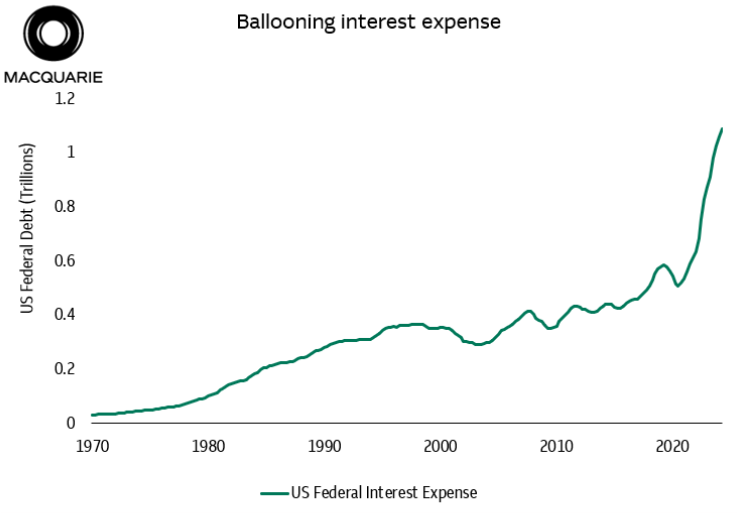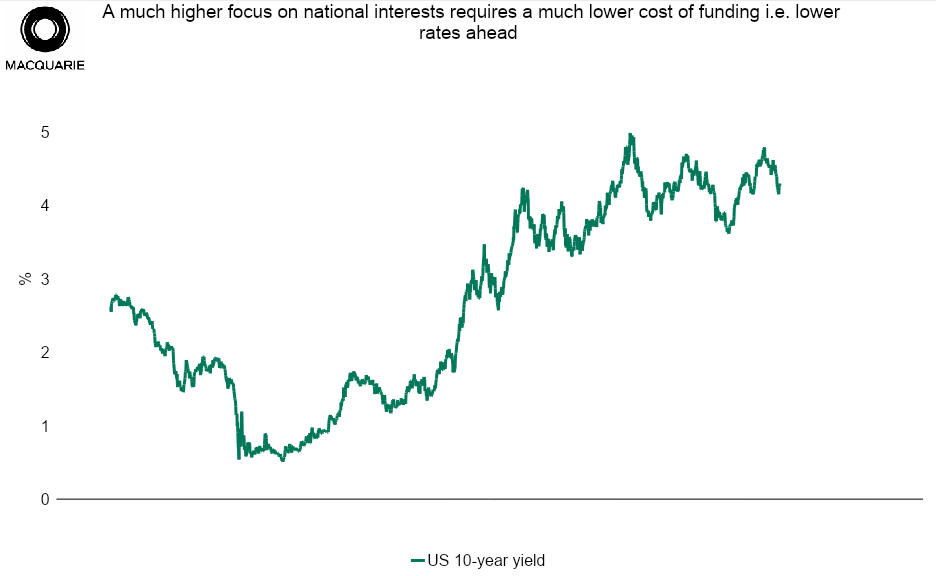Macquarie sees rates moving much lower, creating opportunities in bond markets

Bonds are back, and investors should take note before the opportunity passes as structural shifts take root in the global economy.
After years of rock-bottom interest rates followed by an aggressive rate-hiking cycle, fixed income yields have surged to multi-year highs, drawing investors back to bonds.
However, according to Brett Lewthwaite, CIO and Global Head of Fixed Income at Macquarie Asset Management, these elevated yields won’t last. He predicts that 10-year US Treasury yields - the global benchmark for rates - will move much lower than the current level, as inflation continues its downward trajectory.
If the prediction comes to fruition it would mark a seismic shift in the fixed income landscape, creating substantial opportunities for investors to lock in strong returns before yields trend lower.
In an exclusive interview, Lewthwaite shared the team’s positive thesis on bonds and what they see as the best opportunities in fixed income today.
Structural forces are gradually killing inflation
Inflation has been the defining economic story of recent years. The battle to rein it in by central banks has driven up interest rates, sparking debate over whether rates will stay higher for longer.
However, Lewthwaite believes that despite concerns over trade wars and supply shocks, deflationary forces are taking hold.
“It is quite interesting that equity markets have fully embraced the potential of new technology and AI, pricing in a future of rapid advancement. Yet, the disinflationary forces that these very innovations bring through greater efficiency and cost reduction don’t seem to be as widely factored into inflation expectations," he says.
Combined with an aging population, growing government debt and slowing global growth, the long-term case for lower interest rates becomes convincing.
“We live in an incredibly indebted world. When you live in very indebted times, it’s very difficult to have structurally higher inflation because higher interest rates lead to higher interest payments, stretching government budgets,” he says.

With inflation pressures easing and economic growth likely to moderate, Lewthwaite sees bond yields trending lower in the coming years.
“We see bond yields trending much lower in the coming years," Lewthwaite says.

Source: Bloomberg, 10 March 2025
Income, capital growth and stability: The case for bonds today
Unlike previous years, today’s bond market offers more than just meagre yields - it presents a compelling trifecta of high income, potential capital appreciation and portfolio stability.
Bond prices and interest rates generally move inversely, meaning that as yields fall, bond prices rise. This dynamic had largely faded during the prolonged era of ultra-low rates throughout the 2010s and the early phase of the COVID-19 pandemic.
"Not only are the returns attractive, but fixed income is once again proving its role as a portfolio stabiliser - especially given where yields stand and the volatility in equity markets," Lewthwaite explains.
For perspective, Macquarie’s bond and income-focused ETFs, Macquarie Dynamic Bond Active ETF (ASX: MQDB) and Macquarie Income Opportunities Active ETF (ASX: MQIO), respectively, currently yield between 4.3-5.3%, while their subordinated debt and high-yield strategies are delivering 6-7.23%. With interest rates poised to decline, investors could see total returns well beyond these headline yields.
The need to be nimble
A core theme in Lewthwaite’s outlook is the growing importance of active management in today’s market.
For over a decade, ultra-low interest rates and abundant central bank liquidity made investing seem effortless. This environment fueled the dominance of passive investing. But with heightened market volatility and a broad spectrum of yields across various risk profiles and credit ratings, Lewthwaite argues that passive strategies now have clear limitations.
"Passive bond funds, by definition, lend to issuers based on an index - not on due diligence. In contrast, Macquarie actively underwrites credit, selecting only the most attractive opportunities and managing risk dynamically," he says.
“The volatility suppression we saw after the financial crisis is gone. Now, you need to be nimble. The idea that passive exposure alone will carry you through this market just doesn’t hold up."
In fixed income, active management is especially critical. As Lewthwaite puts it, “You’re lending money. And I don’t know anyone who freely hands out capital without proper due diligence.”
This is particularly relevant at the lower end of the credit spectrum, where sky-high yields often come with elevated risk.
Two key opportunities Macquarie is tapping
Lewthwaite highlights two key areas with particularly strong potential - global high yield and subordinated debt - both of which Macquarie has made more accessible through new ETF launches.
1. Global high yield
The high-yield market is delivering compelling returns relative to investment grade and government bonds, with the Macquarie Global Yield Maximiser Active ETF (ASX: MQYM) seeking to deliver higher levels of yield than traditional fixed income assets by investing in higher yielding credit.
Unlike traditional high-yield strategies that focus solely on lower-rated credits, MQYM includes BBB-rated securities, looking to strike a balance between quality and attractive yields.
For investors comfortable with some volatility, high yield presents a strong income opportunity, with the added potential for capital appreciation if interest rates decline.

2. Subordinated debt
Hybrid securities have long been a favourite among Australian income investors, but regulatory changes will require banks to phase them out by 2032, creating a gap in the market.
With yields currently in the 6-6.5% range, subordinated debt offers an attractive risk-reward profile, as well as being a natural replacement for hybrids while still delivering strong income.
The Macquarie Subordinated Debt Active ETF (ASX: MQSD) invests in subordinated debt issued by Australian major banks and other financial institutions. While its yield is slightly lower than hybrids, given there are no franking credits available, Lewthwaite emphasises its higher credit quality and greater diversification.
“It’s a higher-quality investment and more diversified. While the returns may be slightly lower, our active management approach allows us to capitalise on market inefficiencies. In some cases, we may even match or outperform direct hybrid investments," he says.

The bottom line
With bond yields still elevated but expected to decline, fixed income is entering a golden age for investors. Macquarie’s Lewthwaite sees a major opportunity in locking in today’s yields before they trend lower while also benefiting from capital appreciation.
At the same time, he stresses that navigating this environment requires active management. The era of 'set and forget' passive investing is over. “Volatility is here to stay,” he warns, “and that’s why it’s time to be selective.”
Introducing new Macquarie fixed income active ETFs
To address the needs of investors, the Macquarie Fixed Income team have added to their growing suite of ASX-traded solutions. Fixed income active ETFs can offer attractive alternatives to hybrid securities, ensuring investors can maintain their defensive exposure with confidence.
3 topics
4 stocks mentioned
2 funds mentioned

